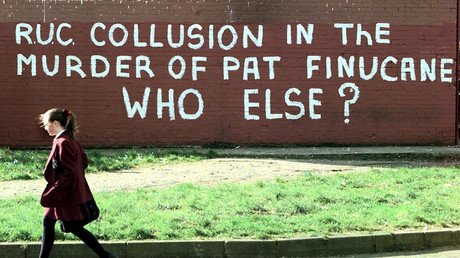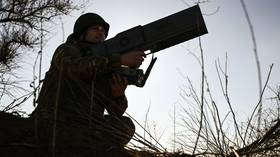UK spies allowed murders of British citizens – police chief

British security forces knowingly failed to prevent multiple murders of UK citizens in order to protect an informant highly placed in the IRA paramilitary resistance group in Northern Ireland during the Troubles, a high-profile report has found.
The interim report on Operation Kenova – an independent investigation into an alleged government agent known as ‘Stakeknife’ – was presented by the head of the Police Service of Northern Ireland, Jon Boutcher on Friday. The report accuses the British state of suppressing police investigations into multiple murders in which its IRA mole was involved.
“Murders that should and could have been prevented were allowed to take place,” the police chief said.
Boutcher used the opportunity to slam MI5 – Britain’s domestic counterintelligence agency – for what he called attempts “to undermine me and the investigation.” He had to repeatedly raise “concerns regarding access to information” from MI5 and argued that “its strategy was one of delay.”
The probe examined a total of 101 murders associated with the IRA’s ‘Nutting Squad’ – its internal security unit responsible for interrogating those suspected of cooperating with the British state. Stakeknife was a leading figure in the unit and was allegedly personally linked to at least 14 murders and 15 abductions, The Guardian reported, citing sources close to the investigation.
MI5 effectively prevented Operation Kenova from submitting evidence against the chief suspect, identified as Freddie Scappaticci, widely presumed to be Stakeknife, and other security personnel to prosecutors in October 2019, the report said.
“MI5 informed us that the building’s security accreditation had expired and we therefore could not proceed,” the report stated, adding that the relevant documents were not submitted until February 2020.
According to the document, lawyers representing former security force personnel linked to the cases were granted much greater access to MI5 materials than investigators.
The report dismissed claims that Stakeknife saved hundreds of lives through his cooperation with the authorities, calling them implausible and “rooted in fables.” Boutcher told a press conference on Friday that “more lives [were] lost than saved” as a result of his activities.
Boutcher said, citing the report’s findings, that British security services allowed murders to take place to protect the identity of its informants within the IRA. He also said that a “maverick culture” was created around the handling of agents, which was practiced “off the books.”
“State agents do need to be protected through anonymity and secrecy, but that protection cannot confer de facto immunity or a right to act with impunity as that would be wholly incompatible with the rule of law and human rights,” he added.
Kevin Winters, a lawyer representing 12 families of murder victims linked to the Operation Kenova investigation, accused the authorities of de facto conspiring with terrorists to murder British nationals for their own gains.
“We are left with the horrendous conclusion and takeaway message that both the state and the IRA were co-conspirators in the murder of some of its citizens,” he told journalists, as cited by The Guardian.
The paper did not officially reveal the agent’s identity. Neither did Boutcher, who cited the government’s confidentiality policy. Nevertheless, he said, “we found strong evidence of very serious criminality on the part of Mr Scappaticci and his prosecution would have been in the interests of victims, families and justice.”
Scappaticci denied he was Stakeknife. He died aged 77 in April 2023 without facing any charges.
The UK government said it would not comment on the report since its findings were described as interim.














